Is the idea of personal boundaries in the bible? What does the bible say about boundaries? In this article we will walk through a short bible study on boundaries to better understand this popular and important subject.
The term “boundaries” has recently become a “buzzword” in our society, but the concept has been around for a while. When we think of boundaries, we think of a barrier, something used to guard or protect. Some boundaries are physical, others are invisible. Our homes have boundaries, a door, and lock to protect whatever is inside. Our bank accounts have boundaries, account numbers and passwords to keep our hard-earned money away from those who would misuse it.
Personal boundaries operate the same way. In 1992, Dr. Henry Cloud and Dr. John Townsend released a book titled, “Boundaries: When to Say Yes, How to Say No, To Take Control of Your Life”. They say setting boundaries helps us “distinguish what is our responsibility and what isn’t.” Boundaries “define what is me and what is not me.” Boundaries allow us to have ownership over our choices and lives.
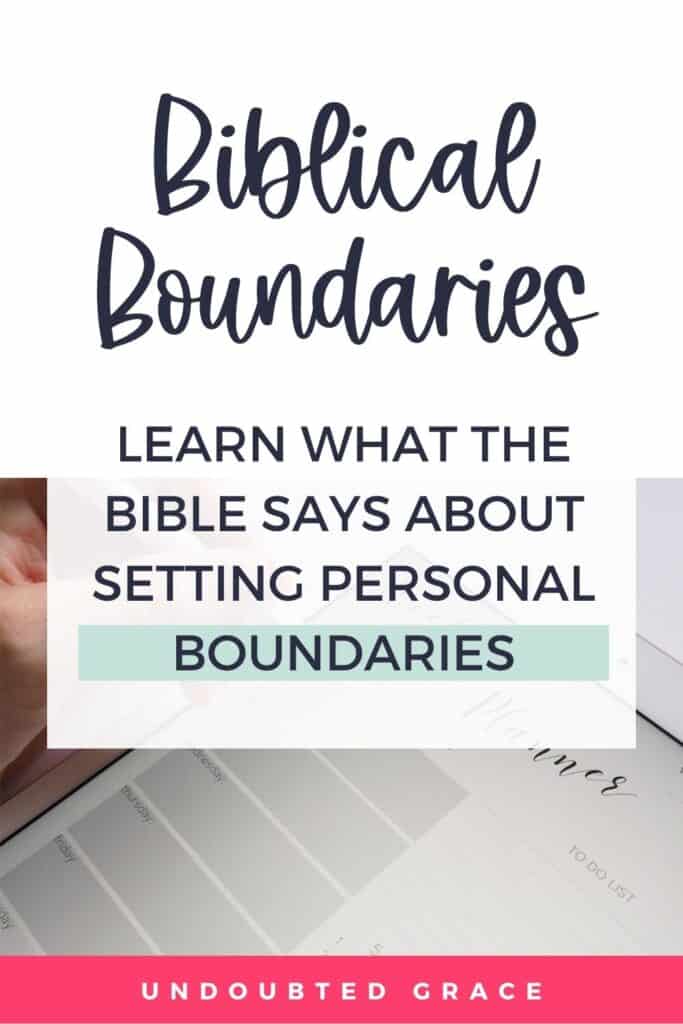
This post may contain affiliate links and I may earn a small commission when you click on the links at no additional cost to you. You can read our entire affiliate disclosure here.
Benefits of Setting Boundaries
While setting personal boundaries may seem harsh or selfish, it is beneficial. Only you have control over how you think and live. Setting boundaries ensures you are looking out for your needs.
Boundaries keep us focused on our priorities.
As we age and our responsibilities grow, we begin to learn our capacity to handle more responsibilities. While we would all like to believe we can be “Supermom,” we know that isn’t possible. All boundaries involve a type of “yes” or “no.” When we find ourselves saying “yes” to too many people or too many volunteer positions, our mental or physical exhaustion sends a message that a boundary needs to be put in place depending on our capacity to take on more activities.
While it may be in our nature to please others by saying yes, how effectively will we be able to perform the task if it is not something we can handle at that time? Establishing a boundary in this way is done by saying,
“I appreciate you thinking of me to help you with the canned food drive. At this time, I cannot take on another obligation. Please ask someone else.”
Saying “yes” to one thing means you are saying “no” to something else. When you take on another responsibility, you are diminishing the time and energy you have for other things and relationships in your life. Even if you are saying “no” to something good, like serving at church, boundaries are still important to keep in place so that your “yes” doesn’t cause burnout.
Also Read: 24 Ways to Say NO: The Art of Setting Healthy Boundaries
Learn God’s intention for Time Stewardship
Embrace a rhythm of working and resting and get more done! Take our Purposeful Productivity Challenge and find more time for the daily tasks that matter and quickly begin creating routines that prioritize rest.
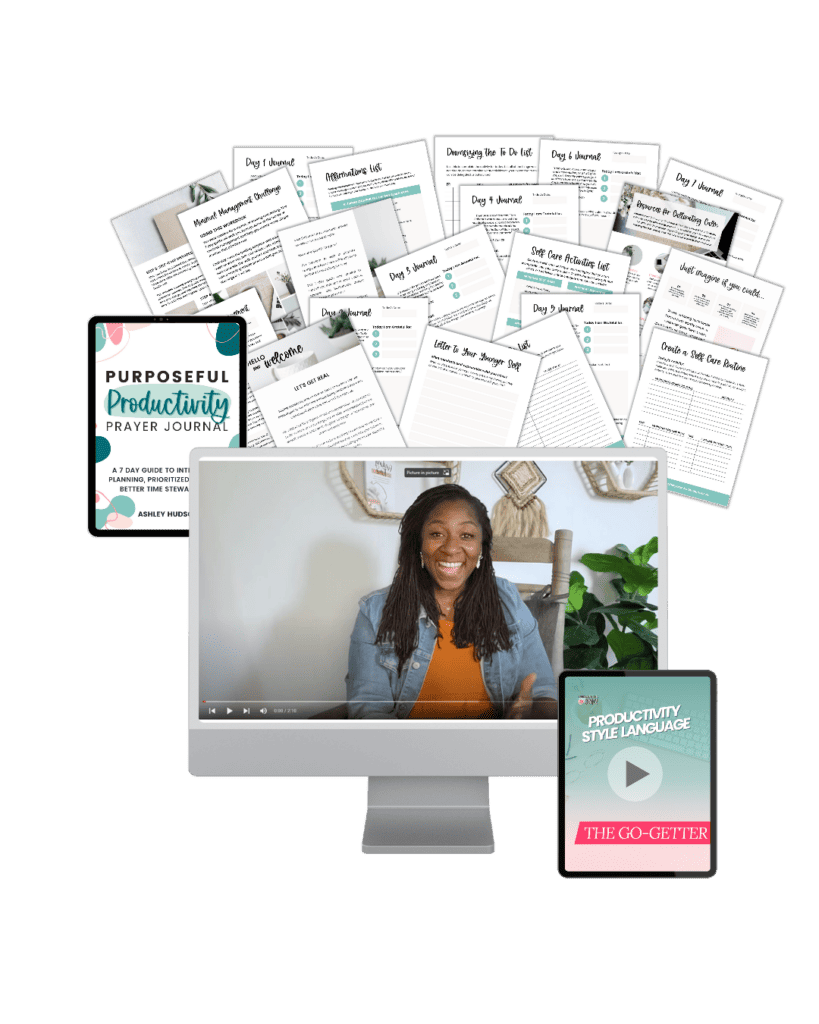
Boundaries work to protect us, physically, emotionally, and mentally.
Boundaries are necessary when a relationship becomes toxic, requiring more energy to keep it peaceful than you have to give. In Lysa TerKeurst’s new book, “Good Boundaries and Goodbyes,” she describes healthy relationships as giving someone 100% access to you and the other person taking 100% responsibility for that access.
If the relationship gets to a point where the responsibility for 100% access begins to diminish, access will need to decrease to match the level of responsibility, and a boundary will need to be put in place after an honest discussion about the situation takes place.
For example, if a friend is consistently 15-20 minutes late to meetings with you, knowing your time is limited due to work or family obligations, yet after a conversation about her tardiness, she continues to be late, you may need to set a boundary in this way:
“I enjoy times where we can get together for coffee and chat, but I carve out time in my day from work and family obligations so we can meet. When you are late, it limits our time or causes me to take more time from work or a family activity. If you cannot respect my time, we may need to limit our interactions to a phone call.”
While this may seem harsh, the other person needs to learn that your time is valuable, as is your friendship. If she wants to continue meeting in person, she will have to adjust her schedule so that she can meet with you on time.
Looking for more topical bible study plans? Check out FREE library of topical reading plans and free bible study printables!
Are Boundaries Biblical?
As humans created by God, we have the right to enforce boundaries to care for our bodies physically, emotionally, spiritually, and mentally. Sometimes this requires us to have a confrontation with another person to let them know that how they are acting is not acceptable and not how we want to be treated. Not having a conversation and enforcing the boundary is enabling them and allowing the destructive behavior to continue.
The Biblical basis for boundaries begins in the first book of the Bible.
In Genesis 2:15–17, God tells Adam that to live in Eden and have a relationship with Him, he must not eat from the tree of the knowledge of good and evil.
“For in the day you eat of it you shall surely die.”
(Genesis 2:17 ESV)
The word “die” refers to a spiritual death, a separation from God. In the beginning, Adam and Eve had 100% access to God. He told them that their responsibility was to not eat from one tree out of the many trees available to them.
In Genesis 3, they take no responsibility for the access God had given them and disobey by eating the fruit. Their consequence, other than causing the entirety of mankind to suffer, was to leave the garden. They no longer had the same access to God.
Throughout the Bible, God gives different people limited access to himself while also establishing boundaries. The Israelites were required to follow God’s laws established in the Ten Commandments to have a relationship with Him. These boundaries allowed God to instruct them and demonstrate to the Israelites that they were God’s chosen people.
In the New Testament, Jesus also demonstrated setting boundaries. While we read about him preaching to multitudes and healing for hours a day, we also see times when Jesus steps away from situations that are not healthy for him, nor does he trust people with 100% access to him.
In John 2:23–24 (ESV), Jesus was in Jerusalem for Passover, and many believed in him because of the miracles he was performing.
“But Jesus on his part did not entrust himself to them, because he knew all people and needed no one to bear witness about man, for he himself knew what was in man.”
Jesus knew that most people could not be responsible for any more access to him than he had already given them. Jesus entrusted himself to his disciples, a small circle of friends, but he knew when to draw the line with those who would not accept responsibility for that relationship.
What Bible Verses Encourage Boundaries in the Bible?
Now let’s look at a few more bible verses about boundaries!
Galatians 5:22-23 ESV
“But the fruit of the Spirit is love, joy, peace, patience, kindness, goodness, faithfulness, gentleness, self-control; against such things there is no law.”
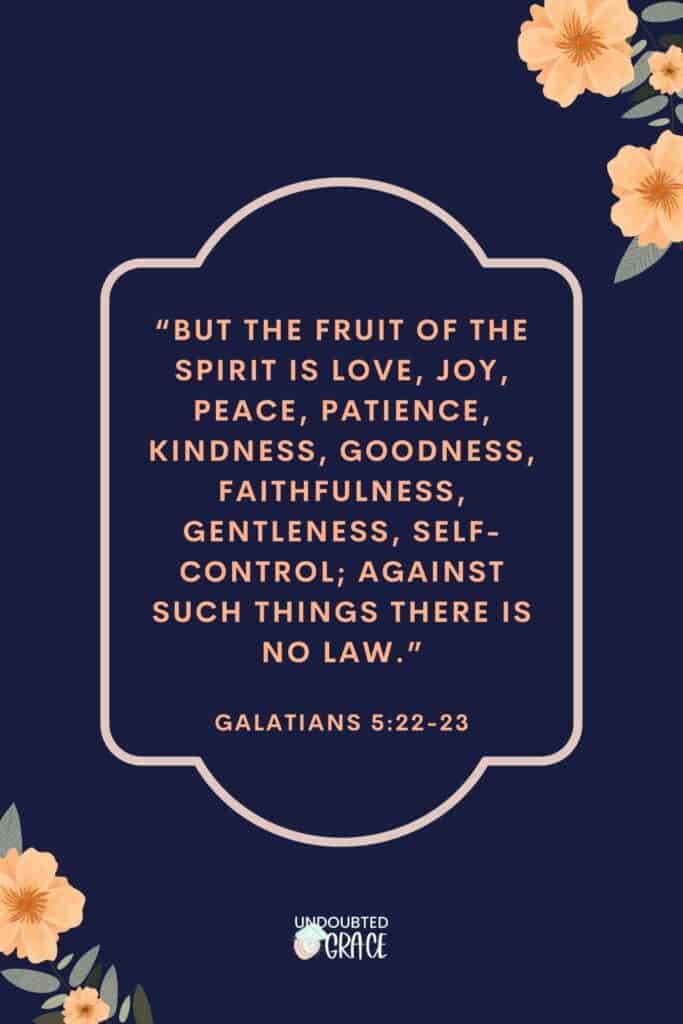
One of the fruits of the spirit is self-control. Allowing the Holy Spirit to produce self-control in you will allow you to discern when a boundary is necessary in your life and your relationships.
Titus 2:11-12 ESV
“For the grace of God has appeared, bringing salvation for all people, training us to renounce ungodliness and worldly passions, and to live self-controlled, upright, and godly lives in the present age,”
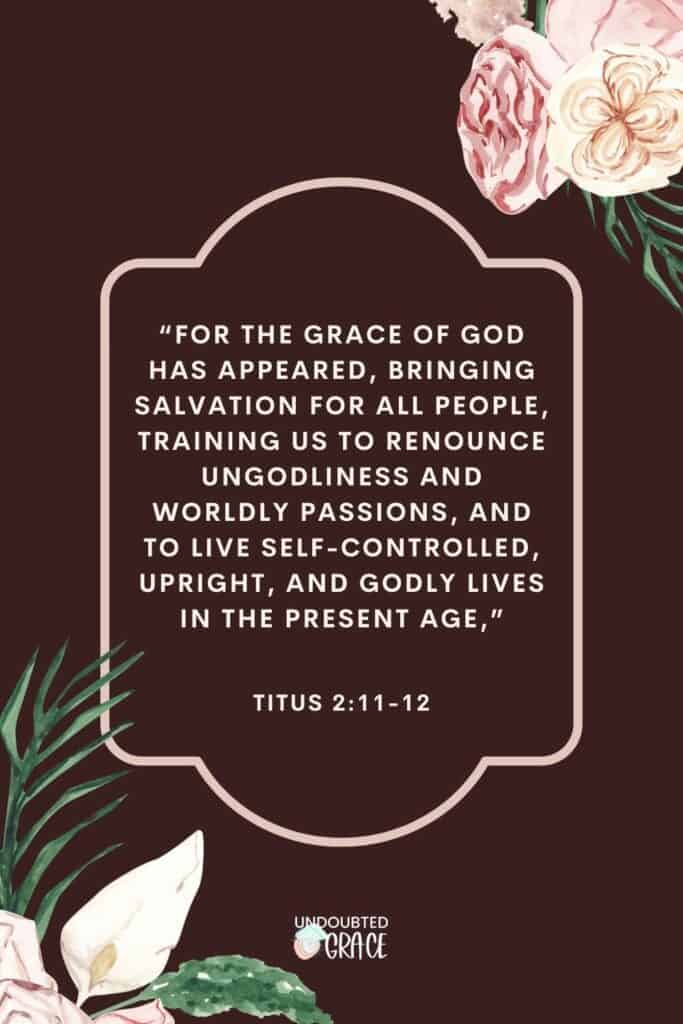
Setting boundaries has to do with living a self-controlled life. Enabling others to treat you with disrespect hinders self-control.
Proverbs 22:5 ESV
“Thorns and snares are in the way of the crooked; whoever guards his soul will keep far from them.”

Guarding your soul is done by enforcing boundaries in relationships and situations that could affect your peace and walk with God.
Proverbs 22:6 ESV
“Train up a child in the way he should go; even when he is old he will not depart from it.”
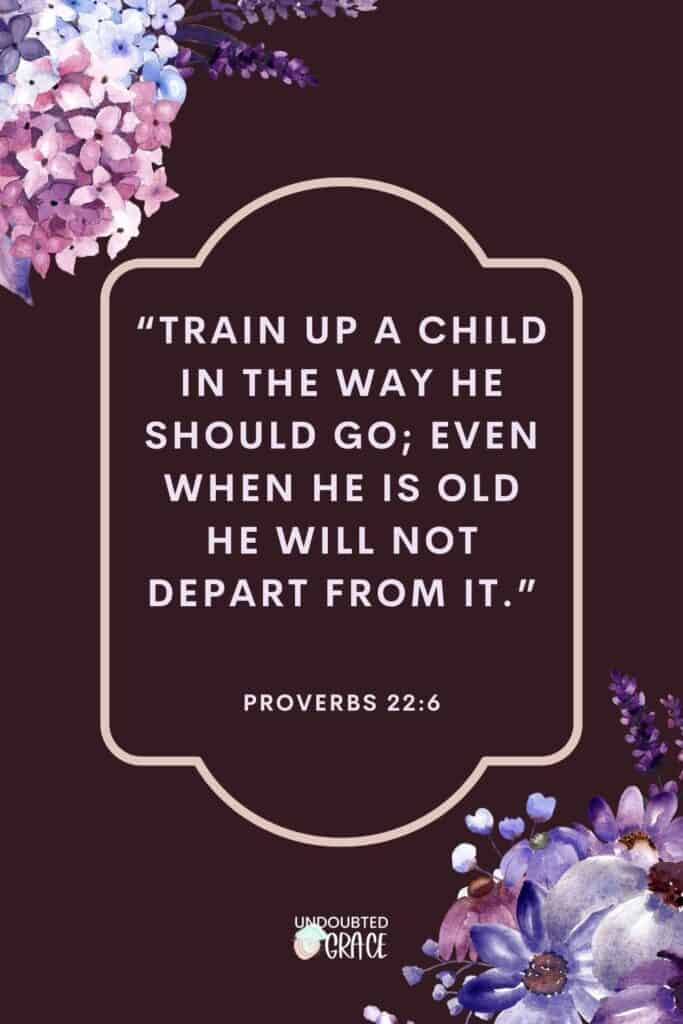
This verse is a command demonstrating the importance of teaching boundaries to our children. If our children are commanded to have boundaries for their lives, we should also set an example of what it looks like to have boundaries.
Ephesians 4:15
“Rather, speaking the truth in love, we are to grow up in every way into him who is the head, into Christ.”
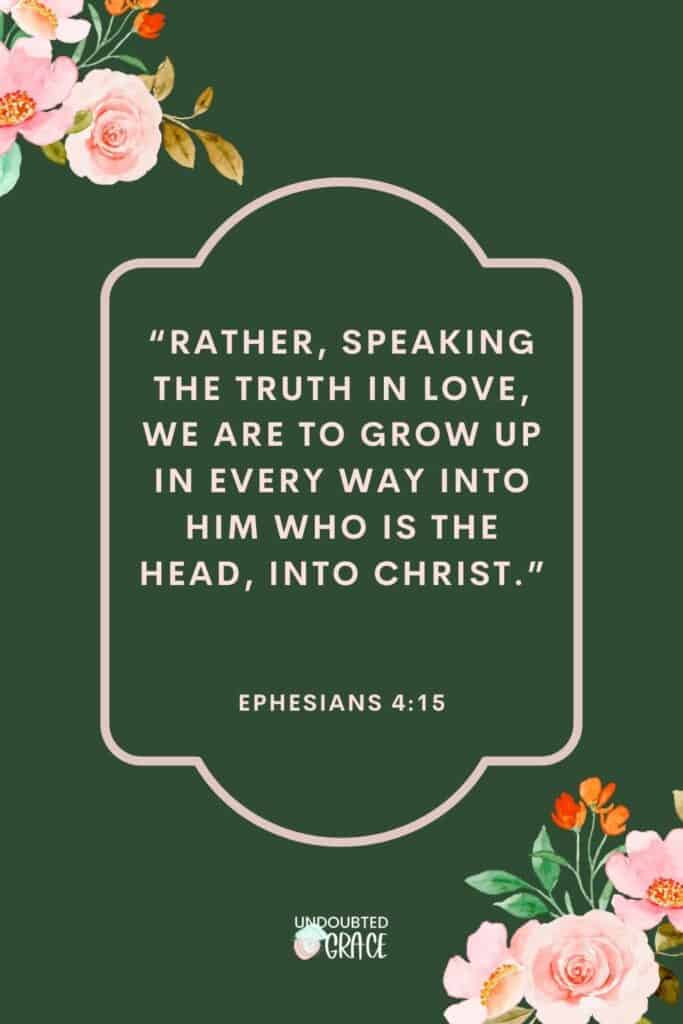
One of the most important things to remember about setting boundaries is that it is not about punishing the other person or cutting them out of your life. Establishing a boundary must first begin with communication, spoken in love with the other person.
Those who are healthy within their boundaries will understand and not be offended by your boundaries. There are times when someone will not understand and take offense. This is when their access to you needs to be diminished to the level of responsibility they are capable of. Always begin with communication spoken in love.
Boundaries promote positive relationships
If you are a people-pleaser and have struggled to set boundaries in your life, you are not alone. Start small and take a look at an area of your life that is the most stressful.
What boundaries do you need to put in place? Do you need to say “no” and step away from a volunteer position? Do you need to have a loving conversation with someone who has been allowed too much access to you without giving the same amount of responsibility?
Take the time to establish boundaries in your life so that more positive relationships can grow with yourself and with others.

Written by: Leah Lively
Leah Lively was born and raised in Virginia. As a mom of four, she has waded through the waters of parenting a child with chronic physical and mental health issues. Leah is passionate about helping others focus on God while walking through the chaos of life. Leah writes to encourage others and grow in their faith. She writes to let other parents know they are not alone. She shares her writing on her blog and social media pages and has also published four Bible studies. In her spare time, Leah enjoys listening to podcasts, hanging out with her kids, settling down with a good book and a cup of coffee, or spending time with friends.


Its definitely harder for a people pleaser to say no and set boundaries. Unfortunately usually these people get pulled here and there and get burnt out and stressed very easily. As a leader, its important to catch up on these cues and set the boundaries for them so others won’t take advantage of them. God bless you for writing this Leah!
Love it girl!! Keep writing!